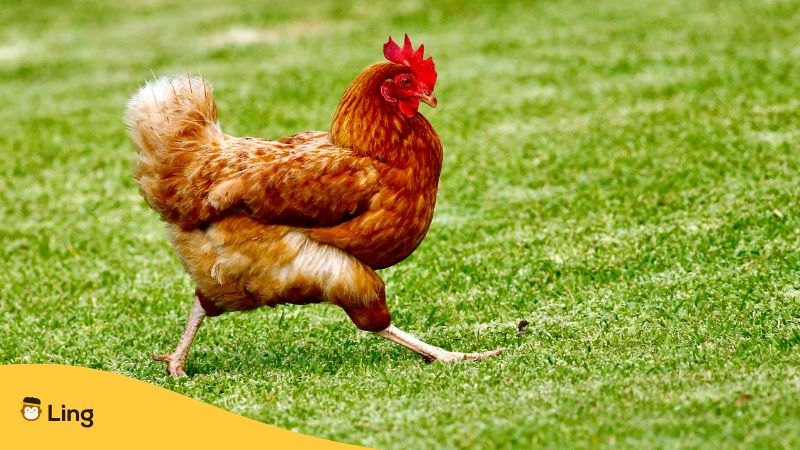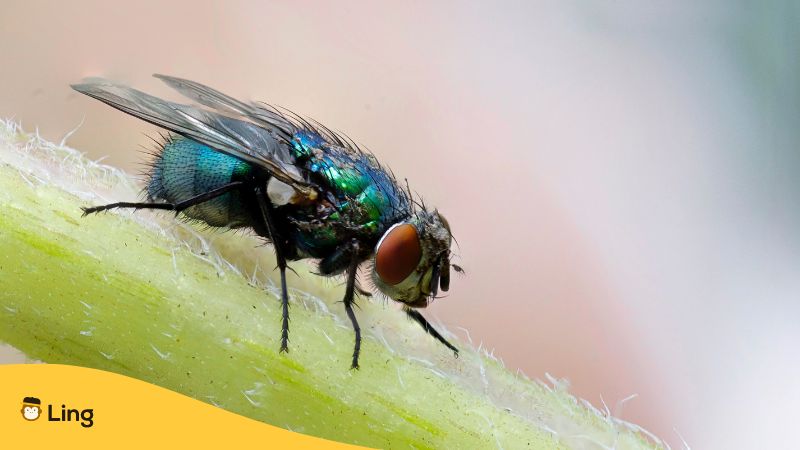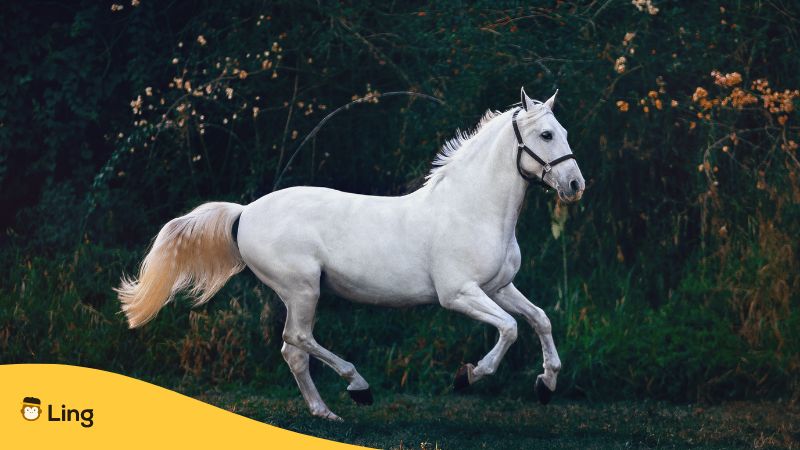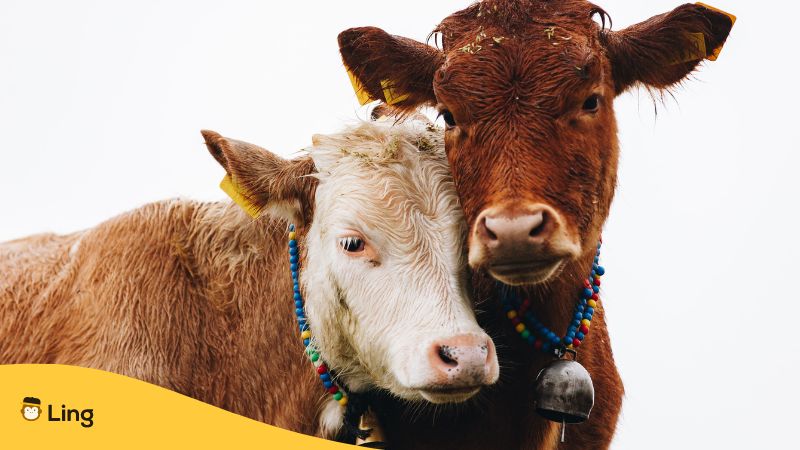American English has an entirely unique set of language nuances that differ from other native English-speaking countries. You start to see these differences in how common expressions, or idioms, come out in everyday conversations.
For example, if someone deceives you, an Australian person would say you let them ‘pull the wool over your eyes.’ In America, we would say that they ‘pulled a fast one on you.’ There are hundreds of examples of these, but we will look at American idioms by category to help break it down. The category in this article is American animal idioms!
Idioms are concise snippets of language meant to render immediate understanding within two parties. A simple expression is much more powerful than explaining what you mean in plain words. This is why they are so common in languages across the world! More often than not, we don’t even realize we’re saying them …
I grew up in the United States, so all of these idioms are hand-picked by me as something an American would actually say. I know the US is a massive country and not every region uses the same expressions, but I am confident that I have a broad grasp of the language you’d hear in any corner of the United States.
How many have you heard of? Let’s begin to unpack these common idioms and their wacky origin stories. Time to learn something new!
Animal Idioms In American English
The United States is a massive country, with beautiful, diverse landscapes and terrain. Around 3,000 different animal species are native to the good ol’ USA. With these insanely diversified animal groups, it’s no wonder there are so many animal idioms used in American English!
Hold your horses, and let’s begin to learn about these idioms and their fascinating origin stories!

#1 To Chicken Out
Meaning: To refuse to do something (usually because you are scared), after previously agreeing to do it
How to use it in a sentence: I swore I would jump off the high dive at the pool today, but I chickened out.
Origins: The etymology of ‘chickening out’ comes from the Union Army enlistment practice back in the 1860s. Once you enlisted for the army, you were provided a chicken. You would go home for your last night with your families, and roast the chicken for dinner. The next day you’d ship off for the army.
If you didn’t come back the next day to go serve your time in the army, you were said to chicken out.
#2 To Be In The Dog House
Meaning: To be in trouble (usually in reference to a significant other).
How to use it in a sentence: I was out late playing golf every night this week while my wife was home with the kids, I’m definitely in the dog house now.
Origins: The logic behind the ‘dog house’ makes sense, as you wouldn’t want to sleep in the dog’s home as it’s quite small, crowded, and uncomfortable. However, there is a deeper, and darker, origin story than what meets the eye.
Back in the days of the slave trade, there was no room for the crew deck members to sleep on the massive cargo ships. This problem was solved by building kennel-like dog houses for the sailors to sleep in. No one wanted to sleep in the ‘dog-house,’ thus the idiom was born. It is painfully ironic, as the human cargo (aka slaves) really were being treated like dogs.
#3 Something Smells Fishy
Meaning: To believe something (or someone) is being dishonest and suspicious.
How to use it in a sentence: She said she didn’t steal the money, but her excuse smells fishy.
Origins: This idiom dates back to fish markets in the 1800s. At a fish stall, you could indicate a fish’s freshness by the smell. Dishonest fishermen would claim their fish was fresh, but the smell caught them in their lies. Thus, this expression was born.

#4 To Be Bull-Headed
Meaning: Referring to someone who is being stubborn.
How to use it in a sentence: You’re so bull-headed, just come to the wedding with us. You’re the only one not going!
Origins: Like most idioms used in American English, ‘to be bull-headed’ dates back to the early 1800s. The temperament of a bull is strong, and they charge forward with strength and determination, but without thought.
The same idea goes for someone who is ‘bull-headed.’ Those people are so stubborn and strong in their convictions, but with no good reason attached to it.
#5 Ants In Your Pants
Meaning: Someone who is unable to sit still out of nervousness or excitement
How to use it in a sentence: He is so excited for the show, he has ants in his pants!
Origins: The term ‘antsy’ (jittery, restless) seemed to have originated in the 1960s. Thus, the idiom ‘ants in your pants’ is literal.
Imagine you’re having a lovely picnic in the middle of a grass field. You sit on the ground, and all the sudden ants swarm you, and get in your pants! That would make you restless, and unable to sit still.

#6 The Birds & The Bees
Meaning: The sex education talk.
How to use it in a sentence: They’re learning about the birds and the bees in health class today.
Origins: The origin story is from a poem by Samuel Coleridge in which he writes how ‘All nature seems at work… The bees are stirring – birds are on the wing.’
Though Coleridge was more relating to the natural world in this poem, ‘the birds and the bees’ was popularized about information on sex and reproduction as the years passed. It’s fascinating how information is passed along, most times unknowingly, from the author to general audiences!
#7 Cat’s Got Your Tongue
Meaning: You’d say this to someone who doesn’t speak, whether out of shyness or shock. Usually, this is said in a taunting manner.
How to use it in a sentence: What, Lucy? Cat’s got your tongue? Why won’t you speak up?
Origins: Another origin story that began in sailing ships! On English sailing ships, anyone entrusted with an important secret would be threatened ‘with the cat’ for blabbing. So, the idiom ‘cat got your tongue’ became slang for ‘are you afraid to tell the secret?’

#8 Dropping Like Flies
Meaning: Lots of things / people falling, passing out, or dying in one swift moment.
How to use it in a sentence: I turned around and they all dropped like flies in this intense 100 degree heat.
Origins: The etymology of this idiom is incredibly dark. In the early 1900s in Atlanta, there was a horrible fire. In a newspaper article about the deadly fire, it was quoted: “I saw men and women rushing back and forth within the flames … then came the choking smoke and they would drop like dead flies.”
The author most likely wrote this metaphor due to the short-lived lives of insects. In a moment’s notice, thousands of flies can drop dead. Thus, the idiom became popularized.
#9 Kill Two Birds With One Stone
Meaning: To achieve two things at once
How to use it in a sentence: While your car is being washed, will you grab me a coffee and kill two birds with one stone?
Origins: As you can imagine from the imagery, this idiom dates back to bird hunts. In the 1600s, people would use slingshots to hunt birds and kill them. It was almost impossible to kill two birds with one stone in the slingshot. Thus, the phrase ‘to kill two birds with one stone’ was used as criticism for taking on too much and failing.
Today, the idiom is usually used in triumph, an expression of happiness that you were able to complete two tasks at once.
#10 A Little Birdie Told Me
Meaning: Used to say that you’ve heard a juicy piece of information from someone else (not named person).
How to use it in a sentence: A little birdie told me that you and Josh are dating, is that true?
Origins: This idiom has biblical roots from the Old Testament of the Bible. In Ecclesiastes 10:20 it reads, “For a bird of the air shall carry the voice, and that which hath wings shall tell the matter.” Over time, this phrase was found in collections of proverbs, and then again in famous authors’ letters in the 1700s.
Today, you’d use this idiom to be playful & irksome to flaunt your knowledge of a secret. The intended recipient of this phrase would bother you until you gave up your secret source.

Rapid Fire Round Of American Animal Idioms
| Idiom | Meaning | Use In A Sentence |
|---|---|---|
| Take the bull by the horns | To bravely deal with a hard situation. | I’m taking the bull by the horns and asking Brad out to dinner. |
| Be a bull in a china shop | A careless person who breaks things or causes immense damage in delicate situations. | Stop being a bull in a china shop and think about how your actions are affecting her feelings! |
| Badger you | To annoy or bother. | I won’t stop badgering you until you tell me where the remote is. |
| Have a cat nap | A short, restful sleep. | I took a 20 minute cat nap before the meeting and I feel so much better! |
| Clam up | To suddenly become quiet & flustered. | Toby clammed up when I asked about his final exam scores. |
| Copy cat | To do the same thing as someone else, to the annoyance of that person. | She is such a copy cat! Why does she have to wear the same exact thing as me? |
| The dog days | Extremely hot, humid, long summer days. | We are in the dog days of August, so I had to stay inside with the air conditioning. |
| Eager beaver | A person who is extremely excited and enthusiastic about a specific task or activity – usually considered a good thing. | After her teacher gave her praise, she was an eager beaver about working on her paintings. |
| Have a cow | To get upset over a minor inconvenience. | Dad had a cow as soon as he realized we didn’t clean the dishes. |
| Hold your horses | Be patient. | Hold your horses, we will get on the rollercoaster soon! |
| Let sleeping dogs lie | Let the problem settle on its own. | Let sleeping dogs lie, don’t start that argument again. |
Even More Animal Idioms

| Idiom | Meaning | Use In A Sentence |
|---|---|---|
| Holy cow! | To be surprised. | Holy cow, I can’t believe you threw me a surprise party! |
| Horsing around | To play roughly, usually talking about children. | Boys, please go horse around outside and not in the house! |
| Get the lion’s share | To get the greatest percentage of something. | Why does he get the lion’s share of the money from the renovation? |
| Kitty corner | In the diagonal direction from a starting point. | The gas station is kitty corner from my house. |
| Let the cat out of the bag | To reveal a large secret. | I let the cat out of the bag and told Katie you were going to ask her to marry you. |
| To make a beeline | To head straight for something in particular. | I made a beeline to the sale section in the store. |
| Monkey see, monkey do | Dumb people follow each other’s actions. | My toddler started swearing after hearing my husband say bad words. Monkey see, monkey do! |
| Nest egg | A sum of money saved for the future. | He has a sizable nest egg for his children’s education. |
| Pig out | To eat a large quantity of food. | She pigged out on McDonalds and now she isn’t hungry for dinner. |
| The elephant in the room | A major problem obviously present but avoided as a subject for discussion because it is more comfortable to do so. | The elephant in the room is that I want a divorce and you know it. |
| Raining cats and dogs | It’s raining really hard. | I can’t go outside, it’s raining cats and dogs! |
Rapid Fire Round Of More Silly Animal Idioms

| Idiom | Meaning | Use In A Sentence |
|---|---|---|
| Rat race | A fierce competition for power, money, or something of value. | They are in a rat race for the promotion. |
| Smell a rat | Suspicion that someone is disloyal. | I asked her not to tell Stacy about my divorce, but I smell a rat. |
| Straight from the horse’s mouth | Directly from the original source. | I swear it’s true, I heard it straight from the horse’s mouth! |
| Until the cows come home | To do something for a very long time. | The babies could cry until the cows come home. |
| To be a dark horse | To be a mysterious person who makes an unexpectedly good showing. | The dark horse candidate ended up winning the mayor election! |
| Fly on the wall | To be an unnoticed observer of a situation. | Man, I wish I could be a fly on the wall for that conversation. |
| Bee’s knees | A really great person or thing. | She’s so friendly and kind, she’s the bee’s knees! |
| Sitting duck | A person with no protection against an attack. | They are sitting ducks in the warzone, they need to get out as soon as possible! |
| A wild goose chase | A foolish and hopeless pursuit. | They are on a wild goose chase for the lost ring. |
| A black sheep | A disfavored or outcast member of a group, usually referring to a family. | He is the black sheep of the family, and rarely comes home to visit. |
| One trick pony | A person or thing with only one area of expertise. | Everyone says he’s so talented, but he’s really just a one trick pony. |
| Puppy love | Young love felt during adolescence. | Don’t worry, it’s just puppy love. They aren’t serious. |
| The early bird gets the worm. | You can get a lot of work done if you wake up early. | Set your alarm for 6am tomorrow, remember, the early bird gets the worm! |
What Was Your Favorite Animal Idiom?
Did anyone else learn something interesting about these animal idioms? My favorites are ‘a little birdie told me’, ‘eager beaver,’ and ‘the bee’s knees.’ What are yours?
Interested in more cultural & entertaining language-learning resources? Check out weird words from around the world and beautiful festivals worldwide. Download the Ling app! It is a user-friendly language learning app with games, quizzes, and interactive features proven to help you learn a new language (and have fun while doing it!)
You can download it for free on the App Store and Play Store.



































































